I dropped a genealogy bombshell on Tina last Tuesday over breakfast. My great-great-grandfather sailed from County Cork in 1889. Now I want us to find the family homestead, trace the records, and maybe knock on some distant cousin’s door in Ireland. Tina’s Caribbean roots don’t connect to the Emerald Isle, but she’s totally game. Between the castle ruins, Celtic history, and proper Irish stout, this genealogy quest sounds like the perfect excuse for an adventure. Ireland travel for heritage anyone?
Why Ireland Travel Connects You to More Than Tourist Sites
Right now, our friends from Ottawa are doing the classic Ireland group tour thing. They’re hitting all the highlights – Cliffs of Moher, Ring of Kerry, Dublin’s Temple Bar. The photos look amazing. Group tours have their place – we learned that in China – but here’s what they’re missing: the tiny parish church where your ancestors got married, the cemetery with your family name carved into ancient headstones, the pub where five generations of your people drank pints before emigrating.
That’s the Ireland most tourists never experience.
Millions of Canadians and Americans share Irish roots. The Great Famine pushed over a million Irish across the Atlantic between 1845 and 1855. They scattered across North America, building new lives while keeping old traditions alive. My family story isn’t unique – it’s actually pretty typical. What makes it special is that we can still trace it back.
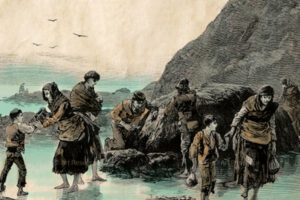
Where to Start Your Irish Heritage Research
You don’t just show up in Dublin and start asking around. Trust me, my wife tried that approach with our Jamaica trip and we wasted two days. Ireland requires homework.
Start with what you know. Family bibles, immigration papers, old letters – anything with dates and place names. Then hit the online records. Ireland’s National Archives, the General Register Office, and various parish registries have digitized thousands of documents. You can narrow down your search area before you even book flights through Boarding Pass Travel.
The island’s divided into four provinces: Ulster, Munster, Leinster, and Connacht. Each has distinct counties. Knowing your ancestor came from “Ireland” helps about as much as knowing they came from “Canada.” Get specific. County Cork differs wildly from County Donegal.
Once you’ve pinpointed a region, that’s your base camp for exploring Ireland.
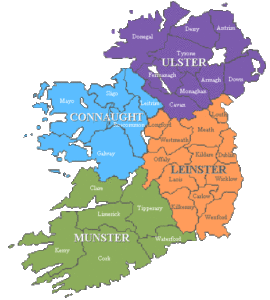
What Makes Irish Genealogy Both Challenging and Rewarding
Here’s the frustrating part. Ireland lost massive amounts of records when the Public Record Office burned during the Civil War in 1922. Census returns, wills, parish registers – gone. It’s like trying to solve a puzzle with half the pieces missing.
But the Irish people? They remember.
Small communities keep oral histories alive. The local parish priest might know your family name. The cemetery caretaker probably has stories. Walk into the right pub and mention your great-grandfather’s name, and someone’s uncle might actually remember hearing about him. This doesn’t happen everywhere anymore, but it happens in Ireland.
I love this detective work. Tina? She loves that every dead-end leads to another pub.
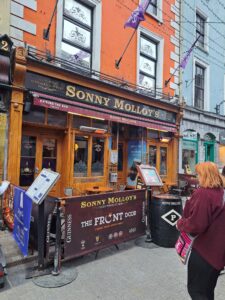
When to Visit Ireland for Heritage Research
Summer’s obvious – long days, decent weather, everything’s open. But the downside: everyone knows this. Tourist sites get packed. Accommodation costs spike. That family cemetery might have a tour bus idling next to it.
We’re planning for May or September instead. Heritage centers and archives stay open. The weather’s decent enough. Plus, locals have more time to chat when they’re not drowning in peak-season tourists. That matters when you’re asking genealogical questions.
Winter works if you don’t mind short days and rain. Irish winters aren’t brutal – rarely below freezing – but they’re damp and gray. Some smaller heritage sites close. On the flip side, you’ll have historians and archivists to yourself.
Combining Tourist Highlights With Heritage Hunting
Our friends are staying in Galway right now and loving it. They’re doing all the classic western Ireland stops. We’re jealous but also plotting our own route that mixes heritage research with the big attractions.
Here’s how we’re thinking about it: spend mornings on genealogy work, afternoons exploring. The National Library and Archives are in Dublin – visit those first. Then head to your ancestral county and split time between research and sightseeing. You came this far; don’t miss the Cliffs of Moher just because you’re chasing family history. Balance matters – we learned that in Greece.
Trinity College, the Book of Kells, Blarney Castle – these places shaped Irish culture for centuries. Your ancestors knew about them. They’re part of your heritage too, even if your people never actually visited them. Hidden corners of Europe often hold the best stories, and Ireland’s no exception.
And honestly? After three hours of squinting at parish records, you need a break. Walking ancient monastic ruins hits different when you’re thinking about your own roots.
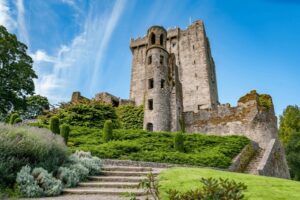
Who Should Consider This Type of Ireland Trip?
Obviously, anyone with Irish heritage. But even if your genealogy trail leads elsewhere, Ireland’s approach to family history might inspire your own research. The way communities preserve stories, the accessibility of records, the willingness of strangers to help – it’s a model worth experiencing.
Couples make good research partners. She’s better at the paperwork trail. I’m better at chatting up locals for family stories. We complement each other.
Multi-generational trips work brilliantly here. Grandparents often know family history that younger generations never learned. Plus, seeing an elderly relative discover their ancestral home? That’s powerful stuff.
Solo travelers can absolutely do this too. Heritage research naturally leads to conversations. You won’t stay lonely long.
The One Activity You Can’t Skip
Book a day at the National Archives or National Library in Dublin. Seriously. Don’t wing this part.
The National Library of Ireland has genealogy advisors who help visitors navigate records. They’ve seen every research challenge imaginable. Bring your homework – family trees, dates, names, locations. They’ll point you toward specific sources you’d never find yourself.
The archives hold the surviving records – whatever escaped the 1922 fire. You can request documents, pour through them, maybe find your people. It’s tedious work. It’s also incredible when you spot your ancestor’s signature or find their marriage certificate.
Plan a full day minimum. You’ll want time to explore leads, request additional documents, take photos. I’ve already blocked out two days for this.
Bonus: both buildings sit near Trinity College. You can walk to proper pubs afterward and toast your ancestors with proper Irish stout.
Finding Your People: The Establishment We’re Hitting First
When we finally make it to Cork, we’re heading straight to The Franciscan Well Brewery. Yeah, it’s a brewery recommendation for a heritage post. Hear me out.
They brew on the site of an actual Franciscan monastery from the 1200s. There’s still a well in the beer garden that Franciscan monks blessed centuries ago. The building has history soaking through the walls – the kind of history my ancestors lived through before sailing away.
Plus, their Rebel Red ale perfectly balances Irish brewing tradition with modern craft beer sensibilities. It’s smooth, slightly sweet, easy to drink while discussing which relatives might have lived nearby. The beer garden fills with locals. Strike up conversations. Ask questions. Cork people love talking about Cork.
Your relatives probably didn’t drink craft IPAs, but they definitely knew about the Franciscan Well. Sitting there connects you to their Ireland, not just tourist Ireland.
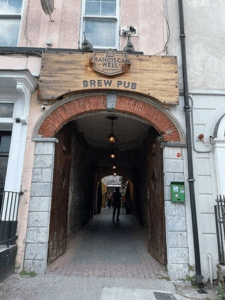
Making Contact With Living Irish Relatives
This is where it gets real. You might actually have cousins in Ireland.
Start with online genealogy forums and Irish surname societies. Many have Facebook groups where descendants reconnect. Post your research, ask questions. Irish genealogy enthusiasts are remarkably helpful – they’ll suggest resources, confirm locations, sometimes even offer to check local records.
DNA testing complicates things. Sure, Ancestry.com might match you with Irish relatives. But showing up unannounced because you’re third cousins according to a website? That’s weird. Make contact online first. Explain your research. See if they’re interested.
Some families stay tight over generations. Others scattered and lost touch. Don’t assume anyone’s waiting for North American relatives to appear. But if you do make legitimate family connections, Ireland becomes something beyond a vacation. It becomes a place with your people.
I’m already practicing my opening line: “Hi, my great-great-grandfather was James David Johnston from Cork, and I think we might be related?” We’ll see how that goes.
Planning Your Heritage Research Trip Through Boarding Pass Travel
We haven’t booked our Ireland trip yet, but when we do, obviously Boarding Pass Travel. Years of experience help us understand that heritage travel needs different pacing than regular tourism.
You need flexibility for research rabbit holes. Maybe that parish registry leads somewhere unexpected. Maybe a local historian wants to meet. Group tours can’t accommodate that. Independent travel with a good travel agent backing you up? That works perfectly.
They can help arrange accommodation near archives, build in research days, suggest heritage sites, and handle the logistics while you focus on finding your roots. That’s the sweet spot for trips like this.
What We’ve Learned From Friends Currently in Ireland
Our Ottawa friends are texting updates constantly. The Guinness Storehouse was crowded but worth it. Killarney exceeded expectations. Irish breakfast might be their new favorite meal. They’re having a blast on their structured group tour.
But they’re also starting to ask questions we’ve been asking. Why did so many Irish leave? What were their lives like before emigration? What would it be like to trace your own family story?
That’s Ireland’s magic. It makes you think about connection – to place, to history, to people who came before.
We’re planning something different than our friends did. Less rushing between highlights, more time in specific regions. Less tour bus, more rental car and walking shoes. Less superficial experience, more depth.
Will we find the family homestead? Maybe. Will we meet distant relatives? Possibly. Will we drink too much Irish whiskey while I photocopy parish records? Definitely.
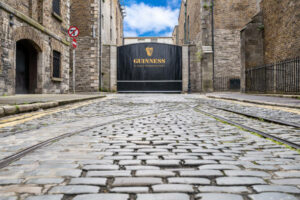
The Ireland We’re Already Imagining
I picture us in some tiny County Cork village, standing outside a stone cottage that might have housed my people. Maybe there’s still a Johnston living there. Maybe it’s been converted to holiday rentals. Either way, we’ll be there, connecting dots across generations.
Then we’ll drive the Wild Atlantic Way, visit Skellig Michael, tour Newgrange, explore Belfast. We’ll do the tourist stuff because it’s genuinely incredible. But we’ll also spend hours in libraries, walk through forgotten cemeteries, and bore pub patrons with genealogy questions.
This is how Ireland travel should be – personal, layered, meaningful. Not just checking off sites, but understanding why those sites matter. Not just drinking Guinness, but drinking it where your great-great-grandfather might have drank it.
We can’t wait to go.
The Beery Traveler

Cheers!

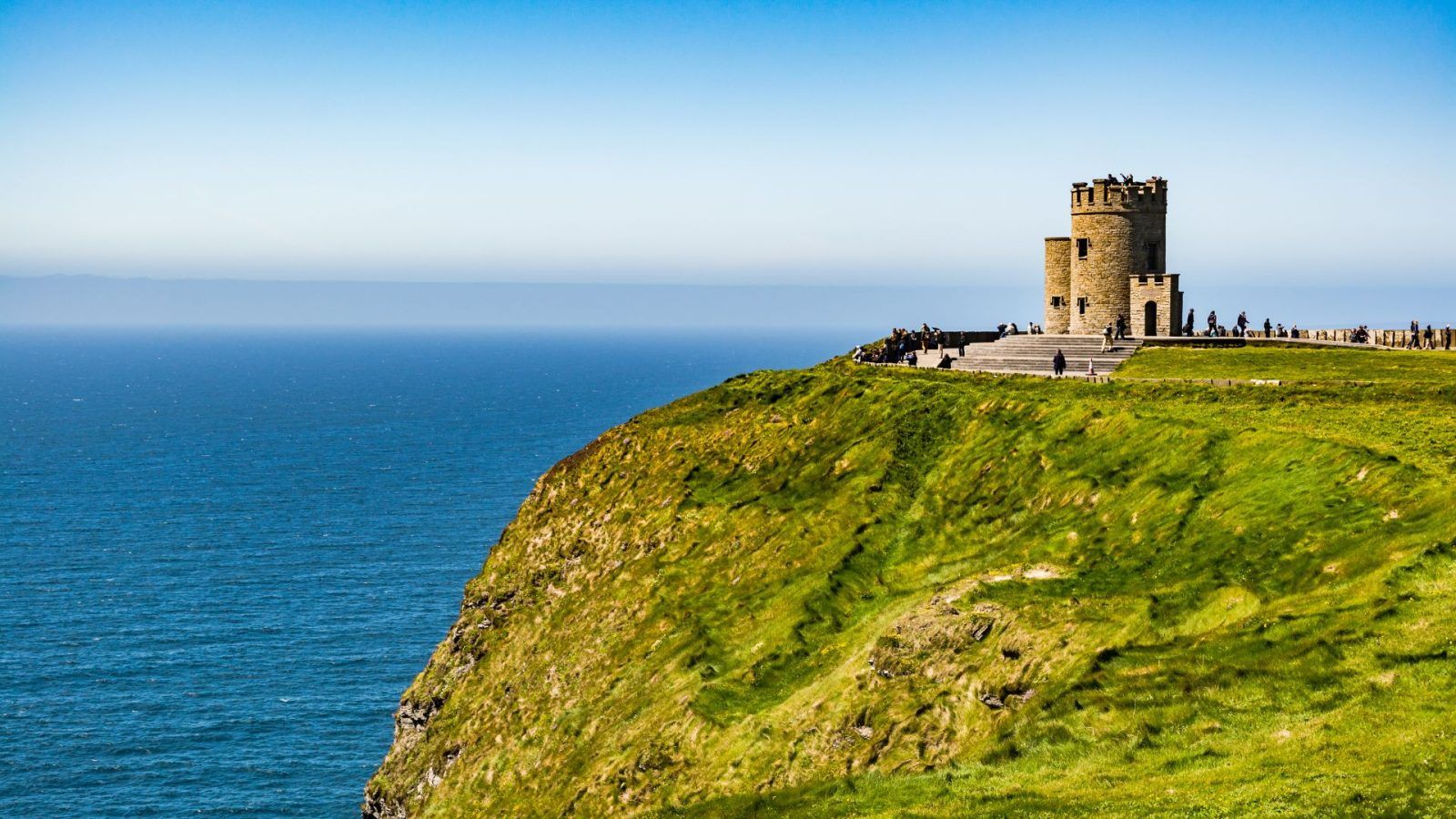
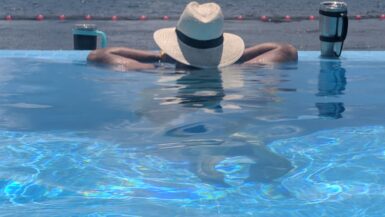
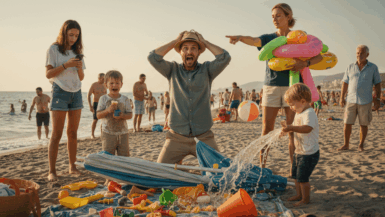

Leave a reply